外研版英语八年级下册Module 5 Cartoon stories语法要点和练习
文档属性
| 名称 | 外研版英语八年级下册Module 5 Cartoon stories语法要点和练习 | 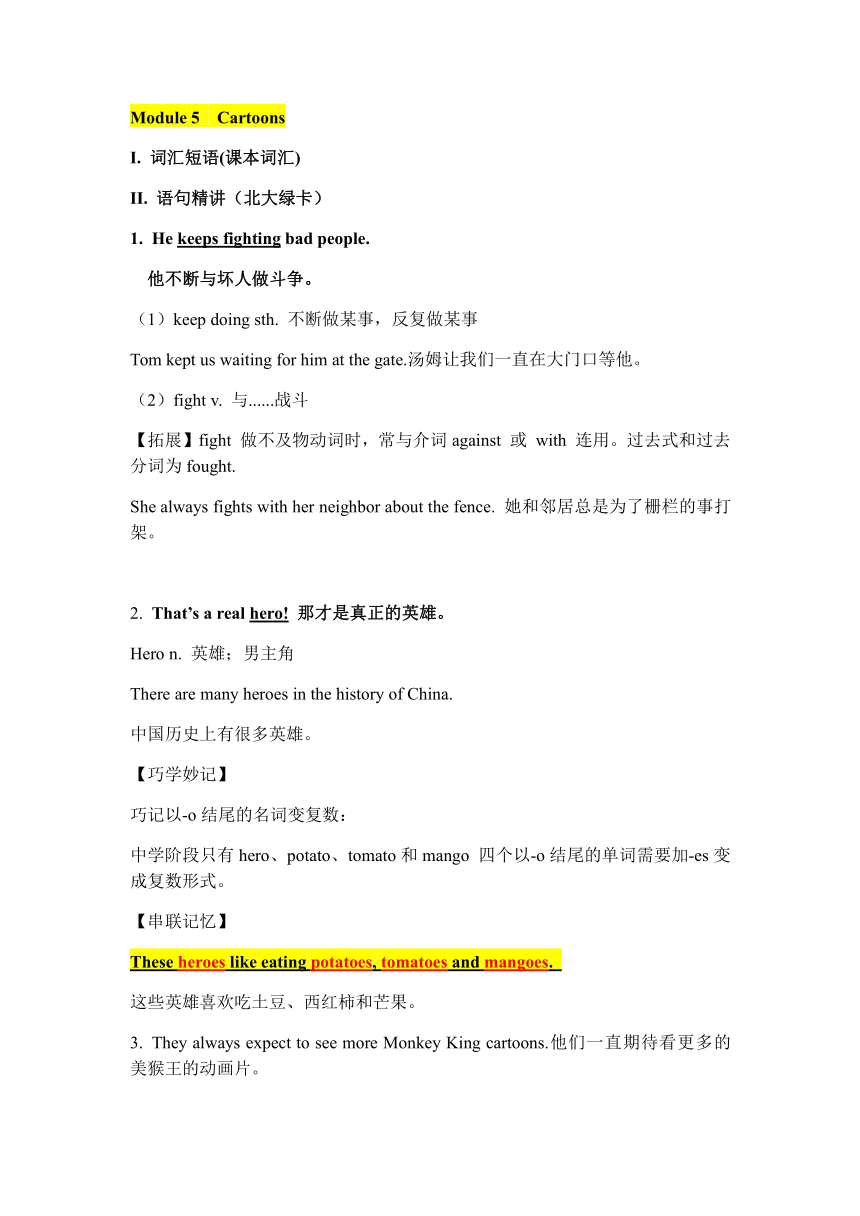 | |
| 格式 | zip | ||
| 文件大小 | 40.0KB | ||
| 资源类型 | 教案 | ||
| 版本资源 | 外研版 | ||
| 科目 | 英语 | ||
| 更新时间 | 2020-05-22 09:35:51 | ||
图片预览

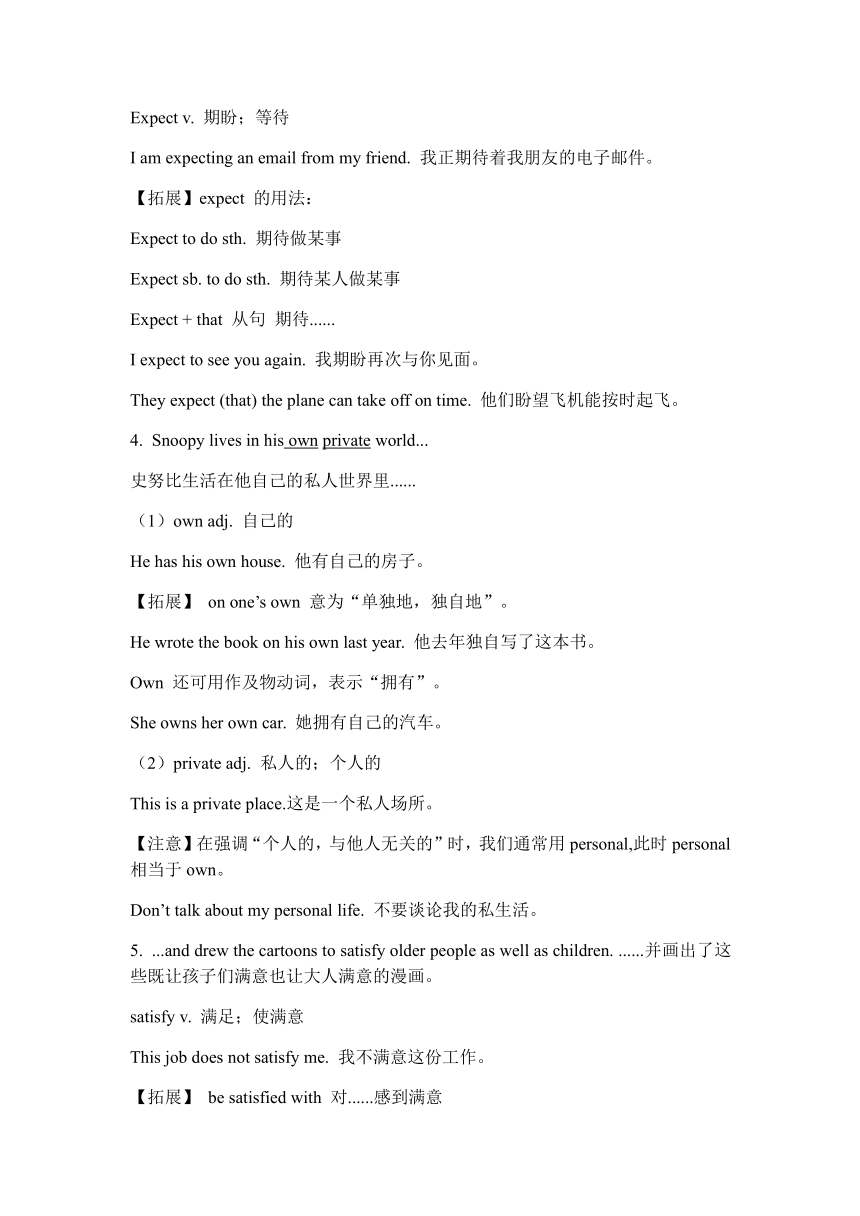
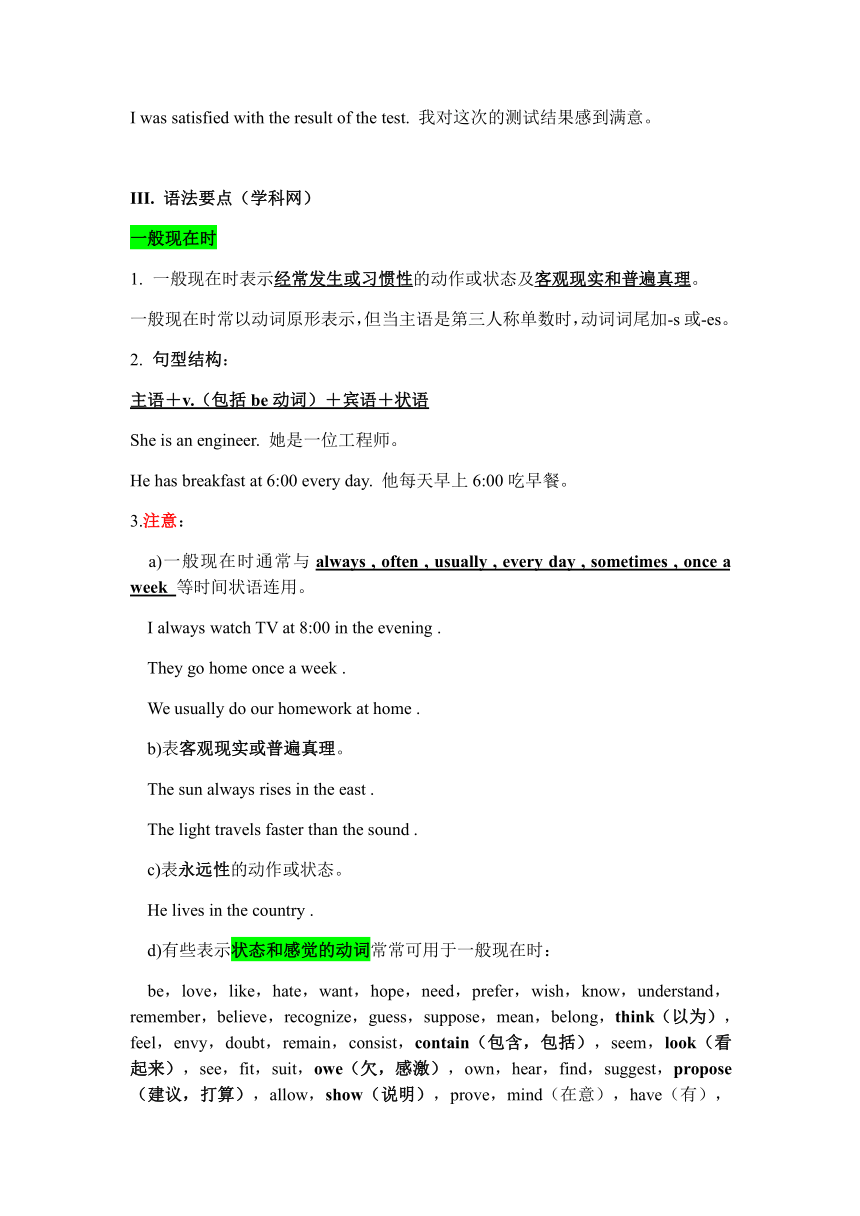
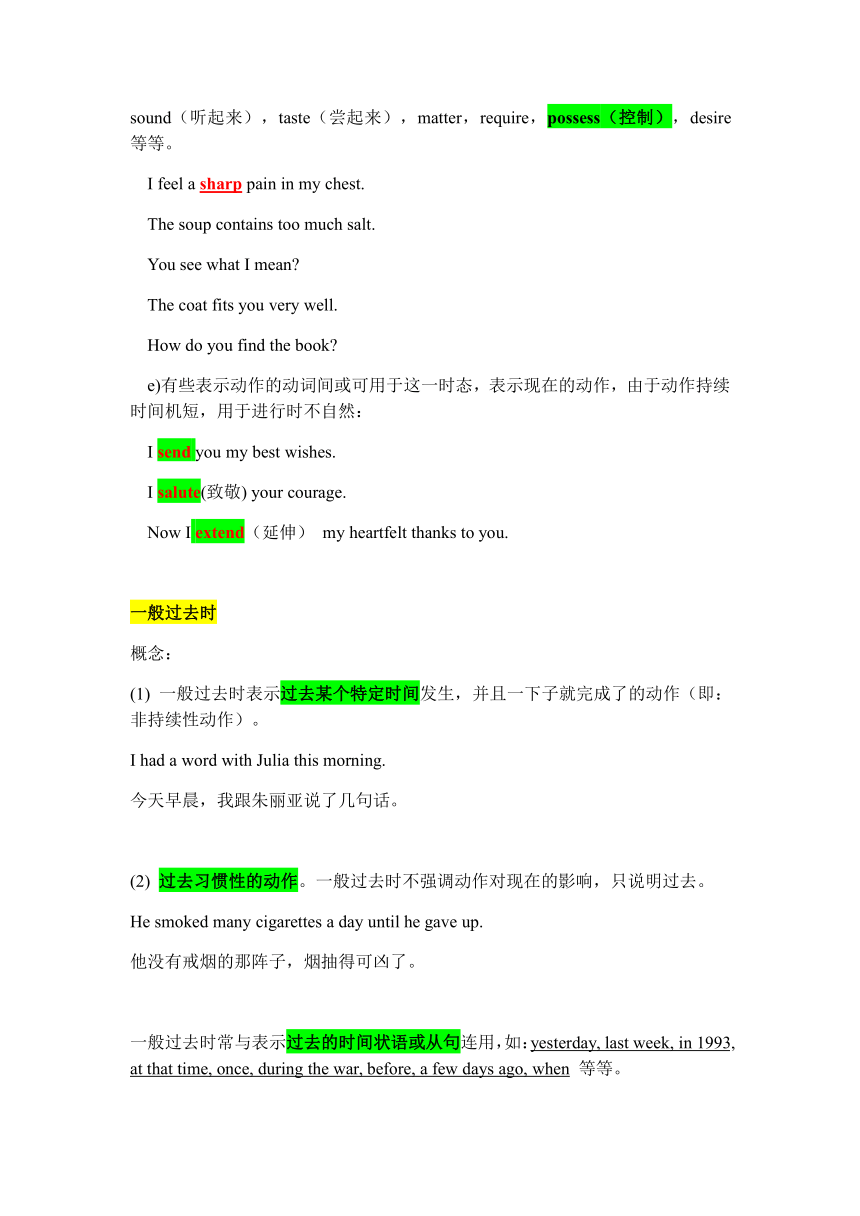
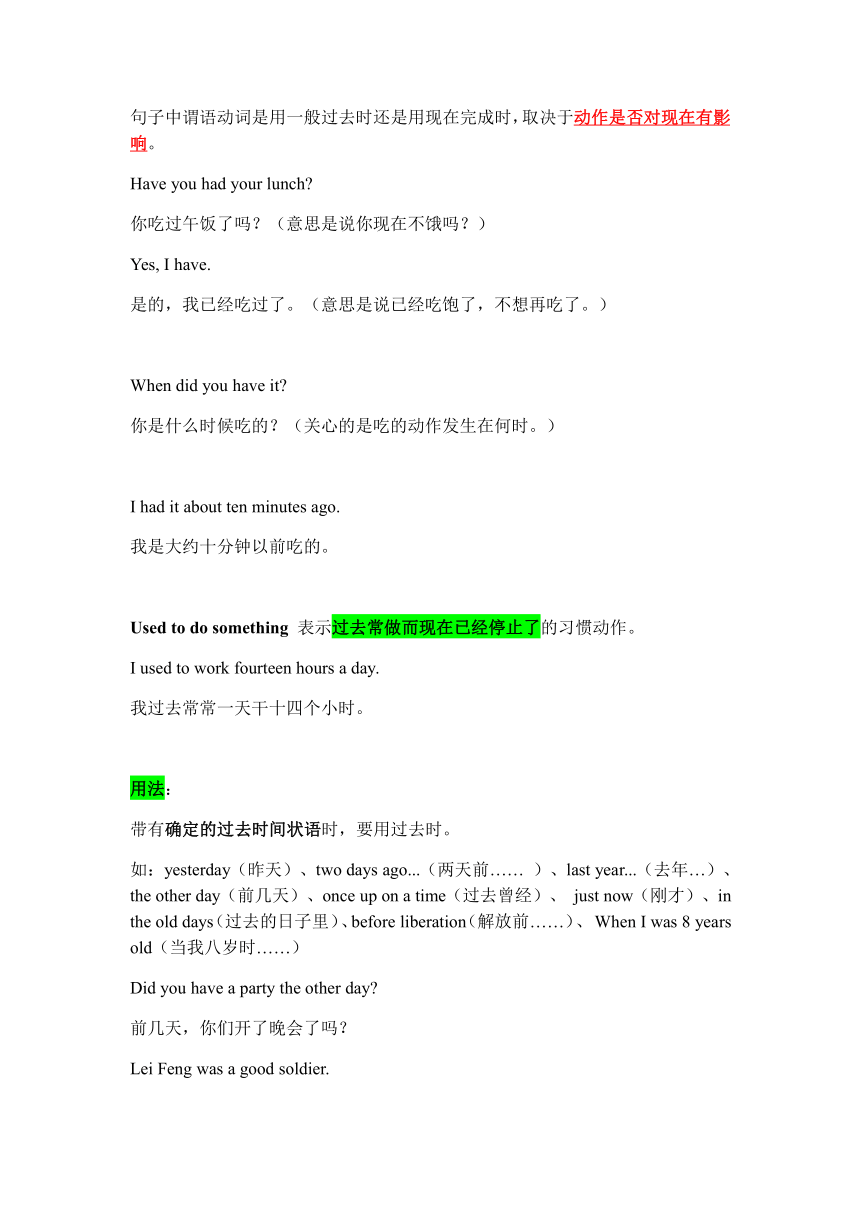
文档简介
Module 5 Cartoons
I. 词汇短语(课本词汇)
II. 语句精讲(北大绿卡)
1. He keeps fighting bad people.
他不断与坏人做斗争。
(1)keep doing sth. 不断做某事,反复做某事
Tom kept us waiting for him at the gate.汤姆让我们一直在大门口等他。
(2)fight v. 与......战斗
【拓展】fight 做不及物动词时,常与介词against 或 with 连用。过去式和过去分词为fought.
She always fights with her neighbor about the fence. 她和邻居总是为了栅栏的事打架。
2. That’s a real hero! 那才是真正的英雄。
Hero n. 英雄;男主角
There are many heroes in the history of China.
中国历史上有很多英雄。
【巧学妙记】
巧记以-o结尾的名词变复数:
中学阶段只有hero、potato、tomato和mango 四个以-o结尾的单词需要加-es变成复数形式。
【串联记忆】
These heroes like eating potatoes, tomatoes and mangoes.
这些英雄喜欢吃土豆、西红柿和芒果。
3. They always expect to see more Monkey King cartoons.他们一直期待看更多的美猴王的动画片。
Expect v. 期盼;等待
I am expecting an email from my friend. 我正期待着我朋友的电子邮件。
【拓展】expect 的用法:
Expect to do sth. 期待做某事
Expect sb. to do sth. 期待某人做某事
Expect + that 从句 期待......
I expect to see you again. 我期盼再次与你见面。
They expect (that) the plane can take off on time. 他们盼望飞机能按时起飞。
4. Snoopy lives in his own private world...
史努比生活在他自己的私人世界里......
(1)own adj. 自己的
He has his own house. 他有自己的房子。
【拓展】 on one’s own 意为“单独地,独自地”。
He wrote the book on his own last year. 他去年独自写了这本书。
Own 还可用作及物动词,表示“拥有”。
She owns her own car. 她拥有自己的汽车。
(2)private adj. 私人的;个人的
This is a private place.这是一个私人场所。
【注意】在强调“个人的,与他人无关的”时,我们通常用personal,此时personal相当于own。
Don’t talk about my personal life. 不要谈论我的私生活。
5. ...and drew the cartoons to satisfy older people as well as children. ......并画出了这些既让孩子们满意也让大人满意的漫画。
satisfy v. 满足;使满意
This job does not satisfy me. 我不满意这份工作。
【拓展】 be satisfied with 对......感到满意
I was satisfied with the result of the test. 我对这次的测试结果感到满意。
III. 语法要点(学科网)
一般现在时
1. 一般现在时表示经常发生或习惯性的动作或状态及客观现实和普遍真理。
一般现在时常以动词原形表示,但当主语是第三人称单数时,动词词尾加-s或-es。
2. 句型结构:
主语+v.(包括be动词)+宾语+状语
She is an engineer. 她是一位工程师。
He has breakfast at 6:00 every day. 他每天早上6:00吃早餐。
3.注意:
a)一般现在时通常与always , often , usually , every day , sometimes , once a week 等时间状语连用。
I always watch TV at 8:00 in the evening .
They go home once a week .
We usually do our homework at home .
b)表客观现实或普遍真理。
The sun always rises in the east .
The light travels faster than the sound .
c)表永远性的动作或状态。
He lives in the country .
d)有些表示状态和感觉的动词常常可用于一般现在时:
be,love,like,hate,want,hope,need,prefer,wish,know,understand,remember,believe,recognize,guess,suppose,mean,belong,think(以为),feel,envy,doubt,remain,consist,contain(包含,包括),seem,look(看起来),see,fit,suit,owe(欠,感激),own,hear,find,suggest,propose(建议,打算),allow,show(说明),prove,mind(在意),have(有),sound(听起来),taste(尝起来),matter,require,possess(控制),desire等等。
I feel a sharp pain in my chest.
The soup contains too much salt.
You see what I mean?
The coat fits you very well.
How do you find the book?
e)有些表示动作的动词间或可用于这一时态,表示现在的动作,由于动作持续时间机短,用于进行时不自然:
I send you my best wishes.
I salute(致敬) your courage.
Now I extend(延伸) my heartfelt thanks to you.
一般过去时
概念:
(1) 一般过去时表示过去某个特定时间发生,并且一下子就完成了的动作(即:非持续性动作)。
I had a word with Julia this morning.
今天早晨,我跟朱丽亚说了几句话。
(2) 过去习惯性的动作。一般过去时不强调动作对现在的影响,只说明过去。
He smoked many cigarettes a day until he gave up.
他没有戒烟的那阵子,烟抽得可凶了。
一般过去时常与表示过去的时间状语或从句连用,如:yesterday, last week, in 1993, at that time, once, during the war, before, a few days ago, when 等等。
句子中谓语动词是用一般过去时还是用现在完成时,取决于动作是否对现在有影响。
Have you had your lunch?
你吃过午饭了吗?(意思是说你现在不饿吗?)
Yes, I have.
是的,我已经吃过了。(意思是说已经吃饱了,不想再吃了。)
When did you have it?
你是什么时候吃的?(关心的是吃的动作发生在何时。)
I had it about ten minutes ago.
我是大约十分钟以前吃的。
Used to do something 表示过去常做而现在已经停止了的习惯动作。
I used to work fourteen hours a day.
我过去常常一天干十四个小时。
用法:
带有确定的过去时间状语时,要用过去时。
如:yesterday(昨天)、two days ago...(两天前…… )、last year...(去年…)、the other day(前几天)、once up on a time(过去曾经)、 just now(刚才)、in the old days(过去的日子里)、before liberation(解放前……)、 When I was 8 years old(当我八岁时……)
Did you have a party the other day?
前几天,你们开了晚会了吗?
Lei Feng was a good soldier.
雷锋是个好战士。
注意:
(1) 在谈到已死去的人的情况时,多用过去时。
(2) 表示过去连续发生的动作时,要用过去时。这种情况下,往往没有表示过去的时间状语,而通过上下文来表示。
The boy opened his eyes for a moment,looked at the captain,and then died.
那男孩把眼睛张开了一会儿,看看船长,然后就去世了。
(3) 表示过去一段时间内经常或反复的动作,常与always,never等连用。
Mrs Peter always carried an umbrella.
彼得太太过去老是带着一把伞。
(只是说明她过去的动作,不表明她现在是否常带着伞。)
现在完成时
1. 现在完成时用来表示现在之前已发生过或完成的动作或状态,但其结果却和现在有联系,也就是说,动作或状态发生在过去但它的影响现在还存在。
结构:have(has)+过去分词(done)
例句
I have lost my wallet.(含义是:现在我没有钱花了。)
Jane has laid the table.(含义是:已可以吃饭了。)
Michael has been ill.(含义是:现在仍然很虚弱。)
He has returned from abroad. (含义是:现在已在此地。)
现在完成时使用中通常和一般过去时相区别,一般过去时也发生在过去,但是基本和现在不再有联系,常用在回忆的描述。
2. 现在完成时可以用来表示发生在过去某一时刻的,持续到现在的情况,常与for,since连用。
Mary has been ill for three days. 玛丽已经病了三天了。
I have lived here since 1998. 自从1998年我就住在这里。
3. 现在完成时往往同表示不确定的过去时间状语连用,如already, yet, just, before, recently, lately等。
He has already obtained a scholarship.
I haven't seen much of him recently (lately).
We have seen that film before.
Have they found the missing child yet?
4. 现在完成时常常与表示频度的时间状语连用,如often, sometimes, ever, never, twice, on several occasion等。
Have you ever been to Beijing.
I have never heard Bunny say anything against her.
I have used this pen only three times. It is still good.
George has met that gentleman on several occasions.
5. 现在完成时还往往可以同包括现在时间在内的时间状语连用,如now, this morning/week/month/year, now, just, today, up to present, so far等。
Peter has written six papers so far.
Man has now learned to release energy from the nucleus of the atom.
There has bee too much rain in San Francisco this year.
The friendly relations and cooperation between our two countries have been enhanced in the past few years.
Up to the present everything has been successful.
6. 现在完成时表示现在之前业已完成的动作,虽然其效果或影响仍然存在但已不再继续,但是有一些现在完成时的句子,在后面加上for+一段时间,则现在完成时的动作就表示延续性。
Thomas has studied Russian.
(现在不再学俄语)
Thomas has studied Russian for three years.
=Thomas began to study Russian three years ago, and is still studying it now.
(同第2点用法第一个例句)
7. 现在完成时还可以用来表示过去的一个时间到现在这段时间内重复发生的动作。
We have had four texts this semester.
8.现在完成时的“完成用法”和“未完成用法”
(1)现在完成时的"完成用法"
现在完成时的"完成用法"指的是动作发生在过去某一时刻并已结束,但该动作对现在产生了影响,与现在情况具有因果关系。
He has turned off the light.
他已把灯关了。
(动作结束于过去,但说明的是现在的情况—灯现在不亮了。)
现在完成时"完成用法"的特点是动作不延续,因此,该时态只能与表示不定的过去时间状语(如:already,yet,before,recently等)、频度时间状语(如:never,ever,once等)、包括现在时刻在内的时间状语(如:this morning / month /year...,today等)连用。
Have you found your pen yet?
你已找到你的钢笔了吗?
(2)现在完成时的"未完成用法"
现在完成时的"未完成用法"指的是动作开始于过去某一时刻,一直延续到现在,或可能还要继续下去。
He has lived here since 1978.
自从1978年以来,他一直住在这儿。
(动作起始于1978年,一直住到现在,可能还要继续住下去。)
I have been in the army for more than 5 years.
我在部队已经呆了五年多了。
(动作开始于5年前,一直延续至今,有可能还要继续下去。)
此种用法的句中常需一个表示一段时间的状语(由since或for引导),或表示与现在时刻相连的时间状语(如:up to now,so far)等。
I have heard nothing from him up to now.
到目前为止我没有他的任何消息。
注意:
(1) 现在完成时的未完成用法只适用于延续性动词,不可用于终止性动词,即瞬间完成或延续时间很短的动词。
如:come,go,arrive,leave,join,become,die等。
(2)现在完成时常见两种句型:
①主语+have / has been+for短语
②It is+一段时间+ since从句
He has been in the League for three years.
或It is three years since he joined the League.
他入团已三年了。
练习
一、单项填空
1. They look sad . Maybe they _________what's happened to the girl .
A. knew B. have known C. must know D.will know
2. He has _______ been to Shanghai , has he ?
A. already B.never C.ever D. still
3. The famous writer _____ one new book in the past two years .
A. is writing B.was writing C.wrote D.has written
4.Zhao Lan ______already ______in this school for two years .
A. was ; studying B. will ; study
C. has ; studied D. are ; studying
5. Harry Potter is a very nice film .I _______ it twice .
A. will see B. have seen C. saw D.see
6.—These farmers have been to the United States .
—Really ? When _____ there ?
A. will they go B. did they go
C. do they go D. have they gone
7. His father ______ the Party since 1978 .
A. joined B. has joined C. was in D. has been in
8. Miss Green isn't in the office . she_______ to the library .
A.has gone B. went C.will go D. has been
二、根据汉语意完成句子
1. 吉姆已做完作业,他现在有空了。
___________________________________________________________
2. 他昨天收到一封信。
___________________________________________________________
3. 我父亲以前到过长城。
___________________________________________________________
4. 她还没有看过那部新电影。
___________________________________________________________
5. 她去过上海。
___________________________________________________________
6. 他这些天上哪儿去了?
___________________________________________________________
参考答案
一、
1. B 现在完成时主要强调过去发生的动作对现在造成的影响,或过去发生的动作还未结束,一直持续到现在或将来,重点在于对现在的影响。
2. B 现在完成时常与already(已经),just(刚刚,正好),ever(曾经),never(从来,也不;从不),before(以前),yet(仍然)等连用。
3. D 现在完成时常与recently(近来),so far(到目前为止),in the past/“last + 一段时间”等时间状语连用。因为上述短语表示的是从现在起往前推算的一段时间,句中的动作是从过去某一时间或时刻开始持续到现在的。
4. C 现在完成时时常与“for +时间段或since +过去时间点”连用(含从句,从句过去时)。
5. B 现在完成时还与once(一次),twice(两次),three times(三次),several times(几次)等表示重复次数的词语连用。
6. B 现在完成时与一般过去时容易混淆,就是因为它们所表示的动作都发生在过去,但二者又有区别:一般过去时表示过去某个时间发生的事、存在的状态或经常发生的动作,说话的侧重点在于陈述一件过去的事情,与现在没有关系;现在完成时表示与现在有关系的发生在过去的动作,它不与表示过去的时间状语(如yesterday , last week , a moment ago等)连用。
7. D现在完成时中,非延续性动词不能与for和since引导的表示一段时间的状语连用,通常是用相应的延续性动词来代替。
8. A “have/has gone to + 地点”表示“某人去了某地(还未回来)”,指主语所指的人不在这儿。“have/has been in + 地点”表示“在某地呆了多长时间”,常与表示时间的状语连用。“have/has been to +地点”表示“曾经去过某地(但现在已不在那儿)。”
二、
1. Jim has finished doing his homework already. He is free now.
2. He received a letter yesterday.
3. My father has been to the Great Wall before.
4. She hasn't seen the new film yet.
5. She has been to Shanghai.
6. Where has he been these days?
I. 词汇短语(课本词汇)
II. 语句精讲(北大绿卡)
1. He keeps fighting bad people.
他不断与坏人做斗争。
(1)keep doing sth. 不断做某事,反复做某事
Tom kept us waiting for him at the gate.汤姆让我们一直在大门口等他。
(2)fight v. 与......战斗
【拓展】fight 做不及物动词时,常与介词against 或 with 连用。过去式和过去分词为fought.
She always fights with her neighbor about the fence. 她和邻居总是为了栅栏的事打架。
2. That’s a real hero! 那才是真正的英雄。
Hero n. 英雄;男主角
There are many heroes in the history of China.
中国历史上有很多英雄。
【巧学妙记】
巧记以-o结尾的名词变复数:
中学阶段只有hero、potato、tomato和mango 四个以-o结尾的单词需要加-es变成复数形式。
【串联记忆】
These heroes like eating potatoes, tomatoes and mangoes.
这些英雄喜欢吃土豆、西红柿和芒果。
3. They always expect to see more Monkey King cartoons.他们一直期待看更多的美猴王的动画片。
Expect v. 期盼;等待
I am expecting an email from my friend. 我正期待着我朋友的电子邮件。
【拓展】expect 的用法:
Expect to do sth. 期待做某事
Expect sb. to do sth. 期待某人做某事
Expect + that 从句 期待......
I expect to see you again. 我期盼再次与你见面。
They expect (that) the plane can take off on time. 他们盼望飞机能按时起飞。
4. Snoopy lives in his own private world...
史努比生活在他自己的私人世界里......
(1)own adj. 自己的
He has his own house. 他有自己的房子。
【拓展】 on one’s own 意为“单独地,独自地”。
He wrote the book on his own last year. 他去年独自写了这本书。
Own 还可用作及物动词,表示“拥有”。
She owns her own car. 她拥有自己的汽车。
(2)private adj. 私人的;个人的
This is a private place.这是一个私人场所。
【注意】在强调“个人的,与他人无关的”时,我们通常用personal,此时personal相当于own。
Don’t talk about my personal life. 不要谈论我的私生活。
5. ...and drew the cartoons to satisfy older people as well as children. ......并画出了这些既让孩子们满意也让大人满意的漫画。
satisfy v. 满足;使满意
This job does not satisfy me. 我不满意这份工作。
【拓展】 be satisfied with 对......感到满意
I was satisfied with the result of the test. 我对这次的测试结果感到满意。
III. 语法要点(学科网)
一般现在时
1. 一般现在时表示经常发生或习惯性的动作或状态及客观现实和普遍真理。
一般现在时常以动词原形表示,但当主语是第三人称单数时,动词词尾加-s或-es。
2. 句型结构:
主语+v.(包括be动词)+宾语+状语
She is an engineer. 她是一位工程师。
He has breakfast at 6:00 every day. 他每天早上6:00吃早餐。
3.注意:
a)一般现在时通常与always , often , usually , every day , sometimes , once a week 等时间状语连用。
I always watch TV at 8:00 in the evening .
They go home once a week .
We usually do our homework at home .
b)表客观现实或普遍真理。
The sun always rises in the east .
The light travels faster than the sound .
c)表永远性的动作或状态。
He lives in the country .
d)有些表示状态和感觉的动词常常可用于一般现在时:
be,love,like,hate,want,hope,need,prefer,wish,know,understand,remember,believe,recognize,guess,suppose,mean,belong,think(以为),feel,envy,doubt,remain,consist,contain(包含,包括),seem,look(看起来),see,fit,suit,owe(欠,感激),own,hear,find,suggest,propose(建议,打算),allow,show(说明),prove,mind(在意),have(有),sound(听起来),taste(尝起来),matter,require,possess(控制),desire等等。
I feel a sharp pain in my chest.
The soup contains too much salt.
You see what I mean?
The coat fits you very well.
How do you find the book?
e)有些表示动作的动词间或可用于这一时态,表示现在的动作,由于动作持续时间机短,用于进行时不自然:
I send you my best wishes.
I salute(致敬) your courage.
Now I extend(延伸) my heartfelt thanks to you.
一般过去时
概念:
(1) 一般过去时表示过去某个特定时间发生,并且一下子就完成了的动作(即:非持续性动作)。
I had a word with Julia this morning.
今天早晨,我跟朱丽亚说了几句话。
(2) 过去习惯性的动作。一般过去时不强调动作对现在的影响,只说明过去。
He smoked many cigarettes a day until he gave up.
他没有戒烟的那阵子,烟抽得可凶了。
一般过去时常与表示过去的时间状语或从句连用,如:yesterday, last week, in 1993, at that time, once, during the war, before, a few days ago, when 等等。
句子中谓语动词是用一般过去时还是用现在完成时,取决于动作是否对现在有影响。
Have you had your lunch?
你吃过午饭了吗?(意思是说你现在不饿吗?)
Yes, I have.
是的,我已经吃过了。(意思是说已经吃饱了,不想再吃了。)
When did you have it?
你是什么时候吃的?(关心的是吃的动作发生在何时。)
I had it about ten minutes ago.
我是大约十分钟以前吃的。
Used to do something 表示过去常做而现在已经停止了的习惯动作。
I used to work fourteen hours a day.
我过去常常一天干十四个小时。
用法:
带有确定的过去时间状语时,要用过去时。
如:yesterday(昨天)、two days ago...(两天前…… )、last year...(去年…)、the other day(前几天)、once up on a time(过去曾经)、 just now(刚才)、in the old days(过去的日子里)、before liberation(解放前……)、 When I was 8 years old(当我八岁时……)
Did you have a party the other day?
前几天,你们开了晚会了吗?
Lei Feng was a good soldier.
雷锋是个好战士。
注意:
(1) 在谈到已死去的人的情况时,多用过去时。
(2) 表示过去连续发生的动作时,要用过去时。这种情况下,往往没有表示过去的时间状语,而通过上下文来表示。
The boy opened his eyes for a moment,looked at the captain,and then died.
那男孩把眼睛张开了一会儿,看看船长,然后就去世了。
(3) 表示过去一段时间内经常或反复的动作,常与always,never等连用。
Mrs Peter always carried an umbrella.
彼得太太过去老是带着一把伞。
(只是说明她过去的动作,不表明她现在是否常带着伞。)
现在完成时
1. 现在完成时用来表示现在之前已发生过或完成的动作或状态,但其结果却和现在有联系,也就是说,动作或状态发生在过去但它的影响现在还存在。
结构:have(has)+过去分词(done)
例句
I have lost my wallet.(含义是:现在我没有钱花了。)
Jane has laid the table.(含义是:已可以吃饭了。)
Michael has been ill.(含义是:现在仍然很虚弱。)
He has returned from abroad. (含义是:现在已在此地。)
现在完成时使用中通常和一般过去时相区别,一般过去时也发生在过去,但是基本和现在不再有联系,常用在回忆的描述。
2. 现在完成时可以用来表示发生在过去某一时刻的,持续到现在的情况,常与for,since连用。
Mary has been ill for three days. 玛丽已经病了三天了。
I have lived here since 1998. 自从1998年我就住在这里。
3. 现在完成时往往同表示不确定的过去时间状语连用,如already, yet, just, before, recently, lately等。
He has already obtained a scholarship.
I haven't seen much of him recently (lately).
We have seen that film before.
Have they found the missing child yet?
4. 现在完成时常常与表示频度的时间状语连用,如often, sometimes, ever, never, twice, on several occasion等。
Have you ever been to Beijing.
I have never heard Bunny say anything against her.
I have used this pen only three times. It is still good.
George has met that gentleman on several occasions.
5. 现在完成时还往往可以同包括现在时间在内的时间状语连用,如now, this morning/week/month/year, now, just, today, up to present, so far等。
Peter has written six papers so far.
Man has now learned to release energy from the nucleus of the atom.
There has bee too much rain in San Francisco this year.
The friendly relations and cooperation between our two countries have been enhanced in the past few years.
Up to the present everything has been successful.
6. 现在完成时表示现在之前业已完成的动作,虽然其效果或影响仍然存在但已不再继续,但是有一些现在完成时的句子,在后面加上for+一段时间,则现在完成时的动作就表示延续性。
Thomas has studied Russian.
(现在不再学俄语)
Thomas has studied Russian for three years.
=Thomas began to study Russian three years ago, and is still studying it now.
(同第2点用法第一个例句)
7. 现在完成时还可以用来表示过去的一个时间到现在这段时间内重复发生的动作。
We have had four texts this semester.
8.现在完成时的“完成用法”和“未完成用法”
(1)现在完成时的"完成用法"
现在完成时的"完成用法"指的是动作发生在过去某一时刻并已结束,但该动作对现在产生了影响,与现在情况具有因果关系。
He has turned off the light.
他已把灯关了。
(动作结束于过去,但说明的是现在的情况—灯现在不亮了。)
现在完成时"完成用法"的特点是动作不延续,因此,该时态只能与表示不定的过去时间状语(如:already,yet,before,recently等)、频度时间状语(如:never,ever,once等)、包括现在时刻在内的时间状语(如:this morning / month /year...,today等)连用。
Have you found your pen yet?
你已找到你的钢笔了吗?
(2)现在完成时的"未完成用法"
现在完成时的"未完成用法"指的是动作开始于过去某一时刻,一直延续到现在,或可能还要继续下去。
He has lived here since 1978.
自从1978年以来,他一直住在这儿。
(动作起始于1978年,一直住到现在,可能还要继续住下去。)
I have been in the army for more than 5 years.
我在部队已经呆了五年多了。
(动作开始于5年前,一直延续至今,有可能还要继续下去。)
此种用法的句中常需一个表示一段时间的状语(由since或for引导),或表示与现在时刻相连的时间状语(如:up to now,so far)等。
I have heard nothing from him up to now.
到目前为止我没有他的任何消息。
注意:
(1) 现在完成时的未完成用法只适用于延续性动词,不可用于终止性动词,即瞬间完成或延续时间很短的动词。
如:come,go,arrive,leave,join,become,die等。
(2)现在完成时常见两种句型:
①主语+have / has been+for短语
②It is+一段时间+ since从句
He has been in the League for three years.
或It is three years since he joined the League.
他入团已三年了。
练习
一、单项填空
1. They look sad . Maybe they _________what's happened to the girl .
A. knew B. have known C. must know D.will know
2. He has _______ been to Shanghai , has he ?
A. already B.never C.ever D. still
3. The famous writer _____ one new book in the past two years .
A. is writing B.was writing C.wrote D.has written
4.Zhao Lan ______already ______in this school for two years .
A. was ; studying B. will ; study
C. has ; studied D. are ; studying
5. Harry Potter is a very nice film .I _______ it twice .
A. will see B. have seen C. saw D.see
6.—These farmers have been to the United States .
—Really ? When _____ there ?
A. will they go B. did they go
C. do they go D. have they gone
7. His father ______ the Party since 1978 .
A. joined B. has joined C. was in D. has been in
8. Miss Green isn't in the office . she_______ to the library .
A.has gone B. went C.will go D. has been
二、根据汉语意完成句子
1. 吉姆已做完作业,他现在有空了。
___________________________________________________________
2. 他昨天收到一封信。
___________________________________________________________
3. 我父亲以前到过长城。
___________________________________________________________
4. 她还没有看过那部新电影。
___________________________________________________________
5. 她去过上海。
___________________________________________________________
6. 他这些天上哪儿去了?
___________________________________________________________
参考答案
一、
1. B 现在完成时主要强调过去发生的动作对现在造成的影响,或过去发生的动作还未结束,一直持续到现在或将来,重点在于对现在的影响。
2. B 现在完成时常与already(已经),just(刚刚,正好),ever(曾经),never(从来,也不;从不),before(以前),yet(仍然)等连用。
3. D 现在完成时常与recently(近来),so far(到目前为止),in the past/“last + 一段时间”等时间状语连用。因为上述短语表示的是从现在起往前推算的一段时间,句中的动作是从过去某一时间或时刻开始持续到现在的。
4. C 现在完成时时常与“for +时间段或since +过去时间点”连用(含从句,从句过去时)。
5. B 现在完成时还与once(一次),twice(两次),three times(三次),several times(几次)等表示重复次数的词语连用。
6. B 现在完成时与一般过去时容易混淆,就是因为它们所表示的动作都发生在过去,但二者又有区别:一般过去时表示过去某个时间发生的事、存在的状态或经常发生的动作,说话的侧重点在于陈述一件过去的事情,与现在没有关系;现在完成时表示与现在有关系的发生在过去的动作,它不与表示过去的时间状语(如yesterday , last week , a moment ago等)连用。
7. D现在完成时中,非延续性动词不能与for和since引导的表示一段时间的状语连用,通常是用相应的延续性动词来代替。
8. A “have/has gone to + 地点”表示“某人去了某地(还未回来)”,指主语所指的人不在这儿。“have/has been in + 地点”表示“在某地呆了多长时间”,常与表示时间的状语连用。“have/has been to +地点”表示“曾经去过某地(但现在已不在那儿)。”
二、
1. Jim has finished doing his homework already. He is free now.
2. He received a letter yesterday.
3. My father has been to the Great Wall before.
4. She hasn't seen the new film yet.
5. She has been to Shanghai.
6. Where has he been these days?
同课章节目录
- Module 1 Feelings and impressions
- Unit 1 It smells delicious.
- Unit 2 I feel nervous when I speak Chinese .
- Unit 3 Language in use
- Module 2 Experiences
- Unit 1 I've also entered lots of speaking competi
- Unit 2 They have seen the Pyramids.
- Unit 3 Language in use
- Module 3 Journey to space
- Unit 1 Has it arrived yet?
- Unit 2 We have not found life on any other planet
- Unit 3 Language in use
- Module 4 Seeing the docto
- Unit 1 I haven't done much exercise since I got m
- Unit 2 We have played football for a year now
- Unit 3 Language in use
- Module 5 Cartoons
- Unit 1 It's time to watch a cartoon.
- Unit 2 Tintin has been popular for over eighty yea
- Unit 3 Language in use
- Revision module A
- Module 6 Hobbies
- Unit 1 Do you collect anything ?
- Unit 2 Hobbies can make you grow as a person.
- Unit 3 Language in use
- Module 7 Summer in Los Angeles
- Unit 1 Please write to me and send me some photos
- Unit 2 Fill out a form and come to learn English
- Unit 3 Language in use
- Module 8 Time off
- Unit 1 I can hardly believe we are in the city ce
- Unit 2 We thought somebody was moving about
- Unit 3 Language in use
- Module 9 Friendship
- Unit 1 Could I ask if you've mentioned this to he
- Unit 2 I believe that the world is what you think
- Unit 3 Language in use
- Module 10 On the radio
- Unit 1 I hope that you can join us one day
- Unit 2 It seemed that they were speaking to me in
- Unit 3 Language in use
- Revision module B
